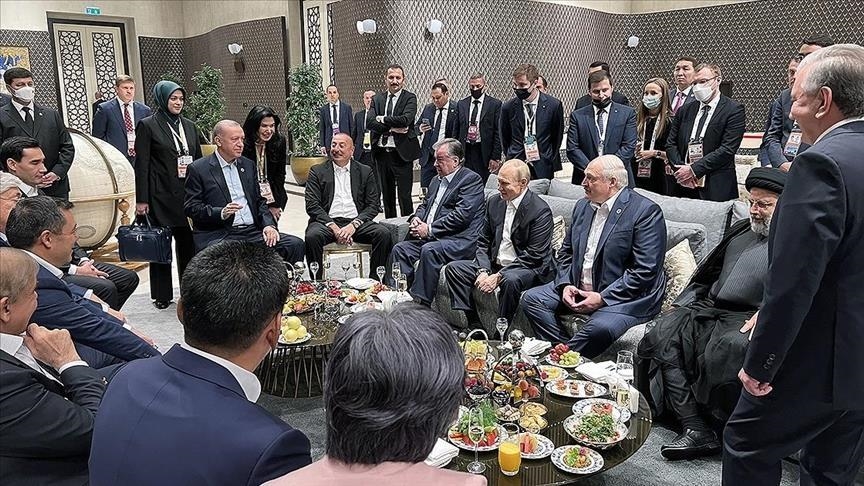ANALYSIS - Türkiye’s foreign policy priorities at SCO summit
Ankara’s proactive foreign policy to SCO can strengthen strategic autonomy vis-vis Western, Asian powers

*The writer is a junior research fellow at the Caucasian Center for International Relations and Strategic Studies (QAFSAM).
ISTANBUL
This week all the attention was on the Shanghai Cooperation Organization (SCO) summit held in Samarkand, Uzbekistan.
Particularly, the picture that reflects the leaders who attended the summit, sitting together and listening to Turkish President Recep Tayyip Erdogan drew the attention of international media.
The photo symbolizes Erdogan's major foreign policy achievements during the Russia-Ukraine war, such as the grain deal, and also reflects Türkiye’s new role in the SCO in the era of a new multipolar world order.
The summit, which brought the presidents of member states Russia, China, Kazakhstan, Kyrgyzstan, Tajikistan and Uzbekistan together, as well as the prime ministers of India and Pakistan, and the presidents of the observer country, Iran, attracted great international interest. Türkiye attended the summit as a special guest with other guest countries, including Azerbaijan, Armenia, Belarus, Turkmenistan and Mongolia.
The organization was founded by eight countries in 2001. The main goals of the organization are strengthening friendly, good neighbor relations, promoting mutual trust and improving security and economic relations among countries.
The SCO is the largest regional organization in Eurasia, covering around 40% of the world population and 30% of global economic output.
In the era of the Russia-Ukraine war, strained relations between China and the US, and unstable situations in different regions in Eurasia, the organization is one of the main platforms for regional powers in Eurasia that promotes a stable security environment.

Türkiye's status in the SCO
In 2012, Türkiye obtained SCO dialogue partner status. However, the country took part in the summit at the presidential level for the first time as Erdogan attended the 22nd Meeting of the Council of Heads of State of the SCO. Erdogan addressed the second session of the summit and held meetings with leaders including Putin and his Chinese counterpart, Xi Jinping.
Türkiye's participation has different political and economic foreign policy priorities, amid growing tension between major powers and growing concern about global economic problems such as rising energy prices and the destabilization of the agricultural products supply chain.
Foreign policy objectives of Türkiye
In terms of its political foreign policy priorities, Türkiye follows a multi-vector and balanced policy among international actors and tries to diversify its relations with Western and Asian countries. Due to its geographical location, Türkiye is one of the main countries that play a key role in the Euro-Atlantic world and Eurasia. Ankara's main foreign policy priority at the summit was to improve its relations with the great powers of Eurasia, especially China, Russia and India, to increase its strategic autonomy, develop different political alternatives, and strengthen its position vis-à-vis Western countries.
Another objective for Ankara is to diversify its relations, as well as to strengthen its credibility and impartiality as a potential mediator by interacting with different countries. The fact that Russia and Ukraine accepted Türkiye as a mediator for the grain agreement, and Beijing’s invitation of the Turkish delegation to visit the Xinjiang province, demonstrates Ankara's reliability and impartiality on the world stage. Moreover, attending the summit at the presidential level shows that Türkiye, as a member of the Euro-Atlantic community, is not only trying to improve relations with the Western world but also prefers to develop relations with the actors in Eurasia as a reliable connection between East and West.
In the context of economic priorities, Türkiye has a great opportunity to expand its trade relations and increase its export to SCO member countries. The total trade volume of SCO member states also increased from $668.09 billion in 2001 to $6.06 trillion in 2020. And its share of global trade increased from 5.4% in 2001 to 17.5% in 2020. Ankara has a great chance to interact with member countries and dialogue partners and strengthen bilateral trade volumes which create mutually beneficial conditions for both sides.
Second, by way of cooperation, Türkiye can create new opportunities for Turkish companies to expand their presence and play a more active role in emerging economies.
Türkiye plays a critical role in the East-West rail trade. Ankara not only makes infrastructure investments in the region but also cooperates with South Caucasian and Central Asian countries at a bilateral and trilateral level for strengthening connectivity through Eurasia.
Last month’s events such as Türkiye-Azerbaijan-Kazakhstan and Türkiye-Azerbaijan-Uzbekistan trilateral cooperation are indicators of Ankara’s connectivity strategy.
Particularly, Türkiye’s Middle Corridor Initiative plays a critical role in the East-West rail trade. In this context, Ankara’s active involvement with the SCO creates a new opportunity for Türkiye to coordinate its Middle Corridor Initiative with member countries' connectivity strategy, especially with China’s Belt and Road Initiative. Cooperation at the SCO level can help improve Ankara and SCO countries' hard and soft infrastructure and optimize railway trade through Eurasia.
To sum up, SCO and new actors in the organization create different political and economic opportunities for Türkiye.
In the short- and medium-term, Ankara’s proactive foreign policy toward the SCO can strengthen its strategic autonomy vis-vis Western and Asian powers and create much better conditions for the continuity of a balanced and multi-vector foreign policy.
**Opinions expressed in this article are the author’s own and do not necessarily reflect the editorial policy of Anadolu Agency.
Anadolu Agency website contains only a portion of the news stories offered to subscribers in the AA News Broadcasting System (HAS), and in summarized form. Please contact us for subscription options.







